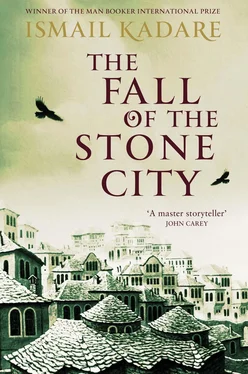Migrations like this were said to be happening everywhere. An evil hour had struck for whole populations, entire peoples uprooted from their homes from the shores of the Baltic to the snowfields of the Caucasus and deep into the distant steppes, supposedly for supporting the Germans.
Other dreadful convoys came to mind. The Jews, three years ago. The Armenians, thirty years before.
The citizens of Gjirokastër watched the scene through binoculars and yearned for an end to these columns from Çamëria, but one convoy seemed to spawn another. It was said that in the Greek-minority villages, at night, people would offer them bread but they would not take it. They had expected that someone else would feed them.
Where were they going? Perhaps north to the olive groves of Vlora. It was rumoured that there the sky had filled with the cruel sound of thunder but something uncanny happened: the lightning rebelled against the laws of nature and refused to fall on these wretches’ heads.
THE NEW ORDER CONTINUED
Dawn rose on the asphalted highway and on this bleak day spirits sank even lower. The cold tightened its grip on Gjirokastër. The coal ran out and martyrs were in short supply.
As if to a natural disaster, trucks of food and medicine were hurriedly dispatched from the capital city with inspectors, musical ensembles and delegations of all kinds, some from fraternal countries. One of these, from the Soviet Baltic republics, where something similar had happened, issued a strange communiqué before it returned, stating that the situation in Gjirokastër called for a more radical approach. In the city there were still eleven former vezirs and pashas of the Ottoman Empire, four former overseers of the sultan’s harem, three former deputy managers of Italian-Albanian banks, fifteen ex-prefects of various regimes, two professional stranglers of heirs apparent, a street called “Lunatics’ Lane” and two high-class courtesans, not to mention the famous three hundred former judges and more than six hundred cases of insanity: a lot for a medieval city now striving to become a communist one.
The Baltic delegation’s communiqué made plain that what was required was an upsurge of renewal, what the newspapers called “new blood”. Very soon this became a flood. Every day enthusiastic young volunteers arrived from central Albania: overfulfillers of already overfulfilled plans, on the Soviet model, some singing the song “Pickaxe in one hand, rifle in the other”, or not just singing about these implements but actually carrying them; informers on saboteurs of ill-planned drainage ditches; informers on fastidious ladies who rarely left their homes in a demonstration of disdain for the new order; activists who only looked forward to the future and others that did so mainly but not exclusively, and occasionally glanced back; sculptors of busts of martyrs; self-sacrificing zealots keen to join the latter in their graves, if nature permitted; opponents of the ideological enemies known as “the three ‘no’s” (imperialism, Zionism and Coca-Cola) and others of the seven ‘no’s; nutcases obsessed with cultivating friendship with other nations and others entranced by the notion of hostility. In short, a perfect frenzy that made everyone weep.
Just when everything seemed on track again, a secret report drawn up by an even more secret delegation from the capital announced bluntly that the rate of progress was still not satisfactory. The ditches, however unnecessary, were being dug too slowly. The former vezirs, hangovers from the time of the sultan, were not dying fast enough. Except for the two high-class courtesans, who had “distanced themselves from their bourgeois past” and joined the new order out of inner conviction, the other remnants of the old order were stubbornly clinging on.
A song was heard in the streets, of the anonymous kind that appeared in Gjirokastër. It spread everywhere and seemed to confirm the secret report. Its words were sad, and its melody even more plangent.
Lena lies sick in a hospital bed.
In the lonely ward, her hopes are dead.
The authorities did all they could to prevent people singing it, but in vain.
Nobody had ever imagined that a song about a hospital could become the reason for another dramatic development in the city: the campaign against its ladies. It all started at a meeting at which a senior cultural official complained that people were still singing songs of what might be called a private nature, about how you’ve forgotten me but I’ll never forget you, you didn’t visit me in hospital, I couldn’t get rid of my cough and twaddle of this sort. The city’s leaders suggested commissioning local musicians to compose two or three songs for the new era, which still had a bit of feeling in them. The Party chairman butted in. “Come out with it — you mean about being ill.” Without more ado he phoned the two doctors, Big and Little Gurameto, to demand the names of the singing patients.
At first the doctors were at a loss how to respond. Big Dr Gurameto replied that they were surgeons and their patients either recovered or went straight to their graves and had no time for sighing and groaning, so it would be better to ask other doctors who dealt with protracted illnesses such as typhus and especially tuberculosis.
Meanwhile, taking advantage of the turbulent times, the Romany guard at the Hygiene Institute known as “Dan the TB Man” produced a song in memory of his girlfriend, who had been run over that April by the night-soil cart.
I’m the gypsy of the institute
In an awful plight
Since the girl I loved
Fell under a load of shite.
The cultural officials chuckled but soon wiped the smiles from their faces. At their next meeting, which turned out to be fatal for them all, they agreed that private feelings involved not only disease and filth, but also nobler sentiments. Unaware of how dearly he would pay for this later, the head of culture recalled an old women’s song.
Sing, nightingale, sing tonight
In our garden of delight.
In your wings of song enfold us,
If we slumber wake us,
From all intrusion guard us
From all detection hide us.
The exclamations of how lovely, how delicate, what sensitivity, prompted the head of culture, as if with the devil at his elbow, to recollect another song describing the same women, this time from the men’s point of view.
Happy lads who woo them, happy lads who love them
Happy lads who count them theirs. .
Retribution came swiftly at an emergency meeting of the Party Committee before the week was out. The meeting denounced decadent trends in the city, nostalgia for the overthrown feudal-bourgeois order and the cult of declassed ladies, whose degraded songs were cunningly described simply as “women’s songs” instead of “songs of the elite”, as our literary critics have classified them.
Angry voices were raised. “Who’s at the bottom of this?” The head of culture fainted twice. Towards midnight the Party chairman made a start on his closing speech with a quotation from Lenin. “Your most dangerous enemy is the one you forget.” He spared no one, not even himself. “Our enemies have caught us napping. Decadence, thrown out the front door, has returned through the back window.” Before properly settling accounts with the notions of Nietzsche, perpetual motion and other perversities, the city was confronted with this virulent plague: its ladies. It was no coincidence that this was happening at a time of renewed tension with Greece and that the US Sixth Fleet had been patrolling the Mediterranean for days. “We will punish the culprits without mercy. Brace yourself for the worst.”
Shortly after the meeting ended, towards two in the morning, the head of culture shot himself.
Читать дальше












